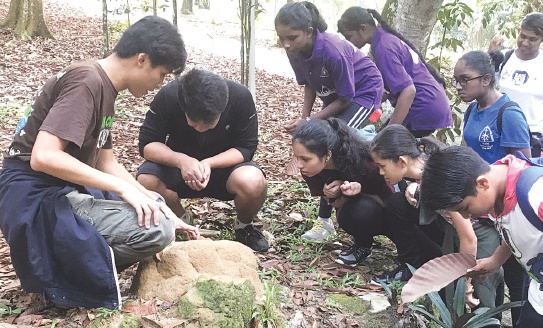June 2018
An ecological immersion programme by AOHD
On a bright Saturday morning, a group gathered at Rimba Ilmu, Universiti Malaya to take part in the ‘ecological immersion’ programme on May 26.
“What is ecology? What is environment?” began Benjamin Ong, as he introduced the participants to the nature walk. Benjamin is a research assistant at Rimba Ilmu and the founder and leader of The Rimba Project.
The objectives and learning outcomes are:
1. Participants will be able to see tropical plants up-close — many of these are rainforest species and may be difficult to encounter in the wild.
2. To learn about the diversity of tropical plants and animals, the threats they face and what can be done to protect them.
3. To see nature in action: Rimba Ilmu is a work in progress, a forest that has been regenerating and growing over the last 50 years in a former rubber plantation.
The guided, narrated walking tour of Rimba Ilmu provides an opportunity to explore and experience the tropical rainforest with its plants and animals in an easily accessible location.
This Rimba Ilmu Nature Walk was organised as part of the ongoing three-year Lenten Campaign theme of Caring for Our Common Home.This Walk included visits to the Rare Plants and Orchids Conservatory and the Rain Forest and Its Environment exhibition.
After the walk, Benjamin Ong showed a video on Bats to illustrate a specific species and their life, to help us appreciate creation. There was also an interactive dialogue led by Fr Bernard Arputhasamy, SJ, Director of the Kuala Lumpur Archdiocesan Office for Human Development.
Fr Bernard reminded everyone about this year’s Lent theme, Caring for our Common Home. “What did we see? Touch? Smell? Perhaps even taste? Did we hear the sounds in the forest?”
An interactive discussion followed with some responses including: seeing a millipede curl to protect itself, seeing fish in the crystal clear running stream and touching/playing with the fresh water, touching and smelling the different leaves and herbs, tasting wild fruit (at one’s own risk!), seeing a mangosteen tree (the first time for some!), listening to the sound of birds and smelling the dry leaves on the ground, seeing the frogs and tadpoles in the pond, spiders spinning their webs. They all have their purpose and are interconnected.
“Come closer, I’ll show you…” repeated Benjamin earlier. He showed and explained the little mound of sand — the home of termites actively at ‘work.’ “This is the cycle of life: we take wood from the forest and termites take the wood back from us!”
One of the highlights was the ‘shower’ some had, thanks to the sprinklers that were turned on just as we entered the Rare Plants and Orchids Conservatory. It was refreshing to touch, feel and dance with creation.
“How can we show our appreciation, that we are thankful, for all that we have experienced today during the learning walk?” We see and hear of plastics, tin cans, rubbish in the stomachs of fish in the sea. Where did these come from? Let us reduce the use of plastics in our homes, communities and churches.
Fr Bernard asked a soul-searching question, “Now that we have done this, how do we change our lives? How can we show our appreciation?” Some responses were: Don’t waste food, water. Don’t throw rubbish such that they block drains and cause floods.
The ecological immersion echoes the words of Pope Francis: “This lack of physical contact and encounter, encouraged at times by the disintegration of our cities, can lead to a numbing of conscience…Today, however, we have to realise that a true ecological approach always becomes a social approach; it must integrate questions of justice in debates on the environment, so as to hear both the cry of the earth and the cry of the poor.” (LS#49)
Article reproduced from Herald Malaysia online


